Introduction
The government funds the National Disability Insurance Scheme (NDIS) to offer assistance to individuals with disabilities in Australia. Within the NDIS framework, participants receive support coordination services aimed at aiding them in navigating the different facets of their NDIS plan. This post delves into the function of NDIS support coordination, offering participants a guide to enhance their comprehension of the support coordination process.
What is NDIS Support Coordination?
The service of NDIS support coordination assists participants in navigating the diverse elements of their NDIS plan. This encompasses service providers, funding, and continuous support.
Support coordination plays a crucial role in the NDIS ecosystem, connecting participants with the right services and supports to realize their plan and goals. NDIS registered providers are an essential part of this process, as they offer specialized assistance tailored to individual needs.
Support coordinators work hand in hand with participants, taking the time to truly understand their requirements and preferences. This personalized approach ensures that the support and services provided align seamlessly with each participant’s distinct circumstances, highlighting the significance of NDIS registered providers in enabling a successful journey towards achieving desired outcomes.
Types of NDIS Support Coordination
Participants have access to three types of NDIS support coordination, which are determined by their individual needs and circumstances. These types consist of:
1- Support Connection:
This fundamental level of support coordination caters to participants with straightforward needs, enabling them to independently manage their plan with minimal guidance. Support connection focuses on facilitating participants’ engagement with service providers and their access to necessary services.
2- Support Coordination:
Participants in need of more substantial assistance in plan management can avail a more intensive version of support coordination. This entails creating a comprehensive plan for the participant, orchestrating services and supports, and overseeing progress toward established goals.
3- Specialist Support Coordination:
The most intense form of support coordination is available to participants with intricate requirements necessitating specialized assistance in plan management. Specialist support coordination involves close collaboration with the participant, their family, support network, and other service providers to effectively coordinate complex services and supports.
The Role of NDIS Support Coordinators
NDIS support coordinators assume a pivotal role in aiding participants to navigate the diverse aspects of their NDIS plan. Some of the primary responsibilities of support coordinators comprise:
Developing a Comprehensive Plan:
Support coordinators collaborate closely with participants to formulate a comprehensive plan outlining their goals and the necessary services and supports for their attainment. Regular reviews of the participant’s plan are conducted to ensure its continued alignment with their preferences and needs.
Coordinating Services and Supports:
Support coordinators assist participants in navigating the array of available services and supports, actively coordinating the delivery of these offerings. This entails facilitating connections with service providers, overseeing funding management, and scheduling appointments.
Monitoring Progress:
Support coordinators track participants’ advancement toward their goals, making pertinent adjustments to the plan when required. This assessment encompasses pinpointing areas necessitating additional support and referring participants to suitable service providers.
Providing Ongoing Support:
Support coordinators deliver continuous assistance to participants, ensuring their effective management of the NDIS plan. This support encompasses information dissemination, skill enhancement, and emotional backing.
How to Engage a Support Coordinator
To avail NDIS support coordination, participants should incorporate it into their NDIS plan. Participants can initiate the process by discussing their requirements with their NDIS planner or by directly reaching out to the NDIS. Upon inclusion in the plan, a support coordinator will be designated to collaborate closely with the participant in formulating and executing their plan.
Tips for Working with NDIS Support Coordinators
Collaborating with an NDIS support coordinator can prove to be a rewarding experience, albeit occasionally challenging. Here are some pointers to aid participants:
Clearly Define Your Goals:
Articulating your goals and priorities distinctly is essential when engaging with a support coordinator. A personalized plan developed through support coordination enables participants to address their specific needs and preferences effectively.
Foster Open Communication:
Effective communication forms the cornerstone of interactions with a support coordinator. Maintain openness and honesty regarding your requirements and preferences, and provide regular feedback to ensure the alignment of your plan with your needs.
Be Prepared:
Before meeting your support coordinator, take time to prepare any inquiries or concerns you might have. This proactive approach ensures that your meetings are productive, enabling your support coordinator to furnish you with the necessary information and assistance.
Cultivate a Positive Relationship:
Establishing a positive rapport with your support coordinator holds significance. This ensures your comfort in discussing your needs and preferences, allowing your support coordinator to offer essential support and guidance.
Stay Actively Engaged:
While your support coordinator will spearhead the coordination of your services and supports, your active involvement in the process is vital. Attend appointments, provide feedback, and play an engaged role in managing your plan to uphold its relevance to your evolving needs.
Conclusion
Support Coordination, NDIS registered providers, and NDIS support coordinators collectively work to empower individuals with disabilities, enabling them to lead fulfilling lives by providing personalized support and resources. Understanding the distinct roles of NDIS support coordinators and NDIS registered providers, as well as the coordination process itself, is key for individuals to make well-informed decisions that can greatly enhance their quality of life.
This comprehensive approach ensures that participants receive the right assistance from NDIS registered providers and support coordinators, tailored to their specific needs and aspirations.


